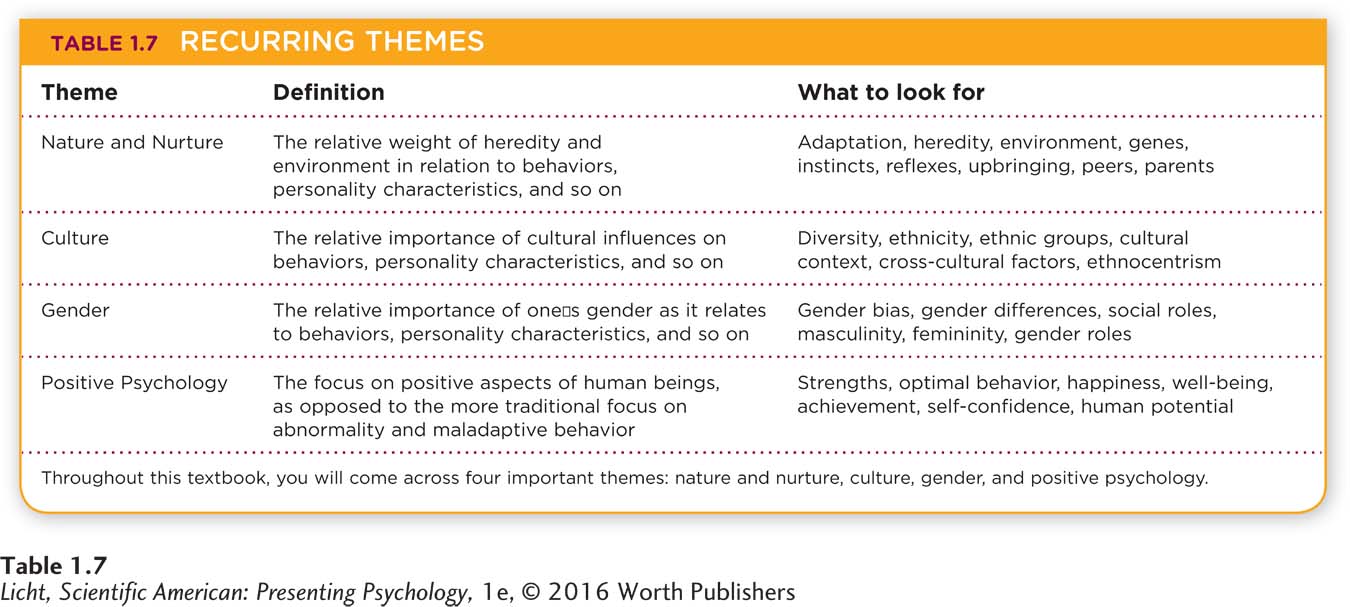summary of concepts


43

LO 1 Define psychology and describe its scope. (p. 3)
Psychology is the scientific study of behavior and mental processes. Psychologists are scientists who work in a variety of fields, studying behavior and mental processes. They conduct two major types of research: basic and applied. Basic research focuses on collecting data to support or refute theories, gathering knowledge for the sake of knowledge. Applied research focuses on changing behaviors and outcomes, often leading to real-
LO 2 Summarize the goals of the discipline of psychology. (p. 6)
The goals of psychology are to describe, predict, explain, and control behavior. These goals lay the foundation for the scientific approach and the research designs used to carry out experiments.
LO 3 Identify influential people in the formation of psychology as a discipline. (p. 8)
The roots of psychology lie in disciplines such as philosophy and physiology. The early philosophers established the foundation for some of the longstanding discussions in psychology (nature and nurture). In 1879 psychology was officially founded when Wilhelm Wundt created the first psychology laboratory, located in Leipzig, Germany. Edward Titchener established structuralism to study the elements of the mind. In the late 1870s, William James offered the first psychology class in the United States, at Harvard, and developed the early school of psychology known as functionalism.
LO 4 List and summarize the major perspectives in psychology. (p. 11)
Psychologists use different perspectives to understand and study issues and topics in the field. Each perspective provides a different vantage point for uncovering the complex nature of human behavior. The psychoanalytic perspective looks at the unconscious conflicts at the root of personality development. The behavioral perspective examines human behavior as learned primarily through associations, reinforcers, and observation. The humanistic perspective focuses on the positive and growth aspects of human nature. The cognitive perspective considers the mental processes that direct behavior. The evolutionary perspective examines heritable traits that increase or decrease in frequency across generations. The biological perspective identifies the physiological basis of behavior. The sociocultural perspective looks at the social and cultural influences that impact behavior. The biopsychosocial perspective explains human behavior in terms of biological, psychological, and sociocultural factors.
44
LO 5 Evaluate pseudopsychology and its relationship to critical thinking. (p. 17)
Pseudopsychology is any approach to explaining and predicting behavior and events that appears to be psychology but is not supported by empirical, objective evidence. Critical thinking, on the other hand, is the process of weighing various pieces of evidence, synthesizing them, and determining how each contributes to the bigger picture. Critical thinking is absent from the “pseudotheories” used to explain the pseudopsychologies.
LO 6 Describe how psychologists use the scientific method. (p. 18)
Psychologists use the scientific method to provide empirical evidence based on systematic observation or experiments. The scientific method includes five basic steps: develop a question, formulate a hypothesis, collect data, analyze the data, and publish the findings. The scientific method is a continuing cycle of exploration, which uses critical thinking at each step in the process, and asks new questions along the way.
LO 7 Summarize the importance of a random sample. (p. 24)
A population includes all members of an identified group a researcher is interested in exploring. If it is a large population, then the researcher will select a subset, called a sample. A random sample ensures that all members of a population have an equal chance of being selected to participate in a study, thus increasing the likelihood of a representative sample being used.
LO 8 Recognize the forms of descriptive research. (p. 26)
Descriptive research is a type of investigation used to describe and explore a phenomenon. It is especially useful for studying new or unexplored topics, when researchers might not have specific expectations about outcomes. Descriptive research methods include naturalistic observation, case studies, the survey method, and the correlational method.
LO 9 Explain how the experimental method relates to cause and effect. (p. 34)
The experimental method is a type of research that incorporates independent and dependent variables to uncover cause-
LO 10 Demonstrate an understanding of research ethics. (p. 39)
Researchers must abide by guidelines to ensure the ethical treatment of research participants. These guidelines encourage psychologists to do no harm; safeguard the welfare of humans and animals in their research; know their responsibilities to society and community; maintain accuracy in research, teaching, and practice; and respect human dignity.